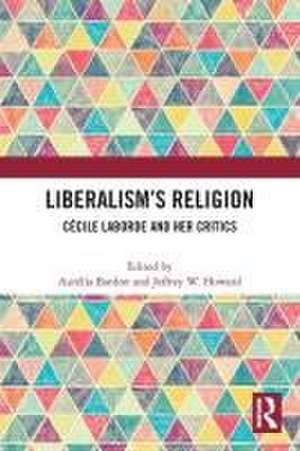Liberalism’s Religion: Cécile Laborde and Her Critics
Editat de Aurelia Bardon, Jeffrey W. Howarden Limba Engleză Paperback – 29 ian 2024
Religion has recently become the object of a significant and growing literature in legal and political philosophy, for example: What does it mean to guarantee religious freedom? When the religious freedom of some citizens appears in conflict with the religious freedom of others, what should be done? May religious reasons be legitimately invoked to justify political decisions, or should they be excluded from public deliberation? In the recent literature, the dominant liberal response to these questions is based on an egalitarian theory of religion.
In her major new work, Liberalism’s Religion, Cécile Laborde argues that the prevailing liberal-egalitarian approach toward religion is misguided and in need of crucial revision. In doing so, she offers powerful and original answers, organised by her distinctive thesis that liberals must radically rethink how we conceive religion itself. This volume subjects her powerful new theory to scrutiny from an array of scholars, engaging each dimension of it. The volume includes a comprehensive reply by Laborde to the various points raised by these scholars, and therefore moves the debate forward, highlighting key issues that should be addressed in the future in the literature on religion and political philosophy.
This book was originally published as a special issue of the journal, Critical Review of International Social and Political Philosophy.
| Toate formatele și edițiile | Preț | Express |
|---|---|---|
| Paperback (1) | 389.66 lei 43-57 zile | |
| Taylor & Francis – 29 ian 2024 | 389.66 lei 43-57 zile | |
| Hardback (1) | 998.08 lei 43-57 zile | |
| Taylor & Francis – 3 iul 2020 | 998.08 lei 43-57 zile |
Preț: 389.66 lei
Nou
Puncte Express: 584
Preț estimativ în valută:
74.57€ • 77.57$ • 61.56£
74.57€ • 77.57$ • 61.56£
Carte tipărită la comandă
Livrare economică 14-28 aprilie
Preluare comenzi: 021 569.72.76
Specificații
ISBN-13: 9780367502683
ISBN-10: 0367502682
Pagini: 148
Dimensiuni: 156 x 234 x 8 mm
Greutate: 0.45 kg
Ediția:1
Editura: Taylor & Francis
Colecția Routledge
Locul publicării:Oxford, United Kingdom
ISBN-10: 0367502682
Pagini: 148
Dimensiuni: 156 x 234 x 8 mm
Greutate: 0.45 kg
Ediția:1
Editura: Taylor & Francis
Colecția Routledge
Locul publicării:Oxford, United Kingdom
Public țintă
Postgraduate and UndergraduateCuprins
Introduction: Laborde, liberalism, and religion
1. Laborde’s religion
2. Is epistemic accessibility enough? Same-sex marriage, tradition, and the Bible
3. Defending broad neutrality
4. On Liberalism’s Religion
5. Liberalism and religion: The plural grounds of separation
6. The integrity of religious believers
7. Individual integrity, freedom of association, and religious exemption
8. Religion and discrimination: extending the ‘disaggregative approach’
9. Three cheers for liberal Modesty
1. Laborde’s religion
2. Is epistemic accessibility enough? Same-sex marriage, tradition, and the Bible
3. Defending broad neutrality
4. On Liberalism’s Religion
5. Liberalism and religion: The plural grounds of separation
6. The integrity of religious believers
7. Individual integrity, freedom of association, and religious exemption
8. Religion and discrimination: extending the ‘disaggregative approach’
9. Three cheers for liberal Modesty
Notă biografică
Aurélia Bardon is Junior Professor in Political Theory at the University of Konstanz, Germany. Her research focuses on public justification, religion, secularism, and liberal neutrality.
Jeffrey W. Howard is Associate Professor of Political Theory at University College London, UK. He writes on free speech, criminal punishment, and democratic theory.
Jeffrey W. Howard is Associate Professor of Political Theory at University College London, UK. He writes on free speech, criminal punishment, and democratic theory.
Descriere
How should liberalism understand – and deal with – religion? Cécile Laborde offers powerful new answers in her book Liberalism’s Religion; this collection subjects that theory to critical scrutiny from an array of scholars, thereby advancing the scholarly debate.
